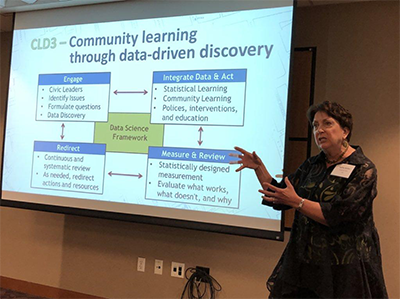By Matt Fall
Executive Director, Center for Data Science, Lansing Community College
Recently, the American Statistical Association (ASA), with support from the National Science Foundation (NSF), hosted a two-day summit in Washington D.C. to discuss outcomes and curricula for data science programs at two-year colleges. The Two-Year College Data Science Summit (TYCDSS) was intended to help spur the growth of data science programs at these institutions and included representatives from two and four-year institutions, government, and industry.

Sallie Keller (Virginia Tech) plenary talk (photo: Nicholas Horton)
The summit included several plenary talks discussing the role of two-year colleges in addressing the need for data scientists as well as a brief presentation from a graduate of a community college data science program. The majority of the summit, however, was devoted to a series of working sessions where the participants discussed ideal outcomes and competencies for three categories of students:
- Category 1: students intending to complete an Associate’s degree and begin working
- Category 2: students intending to earn an Associate’s degree and transfer to a 4-year program
- Category 3: students seeking a certificate
The working discussions provided an opportunity for the summit participants to discuss what was expected and feasible for a student from each category to complete. The discussions were captured by a designated writing group and there will be a forthcoming write-up summarizing the recommendations of the summit participants with guidelines for two-year college data science programs.
This summit was particularly timely for my colleagues at Lansing Community College (LCC) as we have recently begun development of a data science program. Prior to the summit, participants were provided access to a list of resources that included relevant research, reports from related workshops, and sample syllabi. Of particular interest to us, as we design the layout of our program, were the Park City Math Institute’s Curriculum Guidelines for Undergraduate Programs in Data Science (2016) [PDF], the Oceans of Data Profile of the Data Practitioner (2016), and the Oceans of Data workshop report on Building Global Interest in Data Literacy (2016). The resources provided, candid discussions with other two-year colleges regarding their programs, and the discussions about realistic competency expectations were also of interest and informative to our program design.
The intent of the TYCDSS directly supports the MBDH’s priority area of interest in data science, education and workforce development. Two-year colleges provide higher education accessibility to many students who could not or would not otherwise pursue an advanced degree. An increasing number of these schools are offering certificate and Associate’s degree programs in data science and analytics to support growing workforce demand. Growth in these types of programs should naturally lead to an increase in data competency, enrollment in university programs, and larger hiring pools for data science based careers.
Related information:
- American Mathematical Association of Two-Year Colleges’ Data Science Resources Page
- National Academies of Sciences, Engineering, and Medicine: Data Science for Undergraduates: Opportunities and Options
